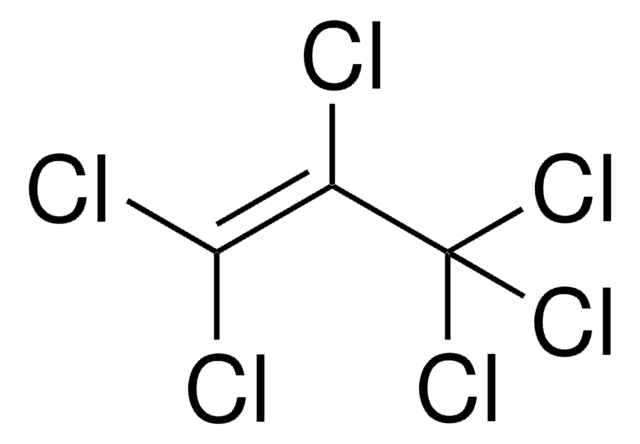320269
Dichlorométhane
ACS reagent, ≥99.5%, contains 40-150 ppm amylene as stabilizer
Synonyme(s) :
Chlorure de méthylène
About This Item
Produits recommandés
Qualité
ACS reagent
Niveau de qualité
Agence
suitable for EPA 1613
Densité de vapeur
2.9 (vs air)
Pression de vapeur
24.45 psi ( 55 °C)
6.83 psi ( 20 °C)
Pureté
≥99.5%
Forme
liquid
Température d'inflammation spontanée
1223 °F
Contient
40-150 ppm amylene as stabilizer
Limite d'explosivité
22 %
Impuretés
Free halogens, passes test
≤0.0003 meq/g Titr. acid
≤0.02% water
Résidus d'évap.
≤0.002%
Couleur
APHA: ≤10
clear
Indice de réfraction
n20/D 1.424 (lit.)
Point d'ébullition
39.8-40 °C (lit.)
Pf
−95 °C (lit.)
Densité
1.325 g/mL at 25 °C (lit.)
Chaîne SMILES
ClCCl
InChI
1S/CH2Cl2/c2-1-3/h1H2
Clé InChI
YMWUJEATGCHHMB-UHFFFAOYSA-N
Vous recherchez des produits similaires ? Visite Guide de comparaison des produits
Catégories apparentées
Application
- Rapid and Comprehensive Analysis of 41 Harmful Substances in Multi-Matrix Products by Gas Chromatography-Mass Spectrometry Using Matrix-Matching Calibration Strategy.: This research uses gas chromatography-mass spectrometry (GC-MS) to analyze harmful substances across various matrices. Dichloromethane is employed as a solvent in the preparation phase, highlighting its application in ensuring accurate and efficient analytical results (Wang Y et al., 2024).
- Brunonianines D-F, three new C19-diterpenoid alkaloids from the Delphinium brunonianum, with therapeutic effect on ovarian cancer in vitro and in vivo.: This study identifies new alkaloids with potential anti-cancer properties, where dichloromethane is utilized in the extraction and isolation processes. Its effectiveness in separating and preserving delicate compounds is critical for their pharmacological evaluation (Li Q et al., 2024).
- LC-HRMS and GC-MS Profiling of Urine Free Cortisol, Cortisone, 6Β-, and 18-Hydroxycortisol for the Evaluation of Glucocorticoid and Mineralocorticoid Disorders.: Utilizes LC-HRMS and GC-MS to profile hormones in urine, with dichloromethane being crucial in the extraction process. This method ensures precision and sensitivity in hormone measurement, essential for diagnosing endocrine disorders (Casals G et al., 2024).
- Determination of vancomycin and meropenem in serum and synovial fluid of patients with prosthetic joint infections using UPLC-MS/MS.: Features a method to measure antibiotics in biological fluids, where dichloromethane is used to prepare samples. This study underscores the solvent′s role in achieving high resolution and detection limits in clinical diagnostics (He J et al., 2024).
Caractéristiques et avantages
Produit(s) apparenté(s)
Mention d'avertissement
Warning
Mentions de danger
Conseils de prudence
Classification des risques
Carc. 2 - Eye Irrit. 2 - Skin Irrit. 2 - STOT SE 3
Organes cibles
Central nervous system
Code de la classe de stockage
6.1D - Non-combustible, acute toxic Cat.3 / toxic hazardous materials or hazardous materials causing chronic effects
Classe de danger pour l'eau (WGK)
WGK 2
Point d'éclair (°F)
does not flash
Point d'éclair (°C)
does not flash
Certificats d'analyse (COA)
Recherchez un Certificats d'analyse (COA) en saisissant le numéro de lot du produit. Les numéros de lot figurent sur l'étiquette du produit après les mots "Lot" ou "Batch".
Déjà en possession de ce produit ?
Retrouvez la documentation relative aux produits que vous avez récemment achetés dans la Bibliothèque de documents.
Les clients ont également consulté
Protocoles
Overcome challenges in synthesis and disulfide bond formation with protocols for Fmoc solid-phase peptide synthesis of peptides with cysteine and methionine.
Overcome challenges in synthesis and disulfide bond formation with protocols for Fmoc solid-phase peptide synthesis of peptides with cysteine and methionine.
Notre équipe de scientifiques dispose d'une expérience dans tous les secteurs de la recherche, notamment en sciences de la vie, science des matériaux, synthèse chimique, chromatographie, analyse et dans de nombreux autres domaines..
Contacter notre Service technique



